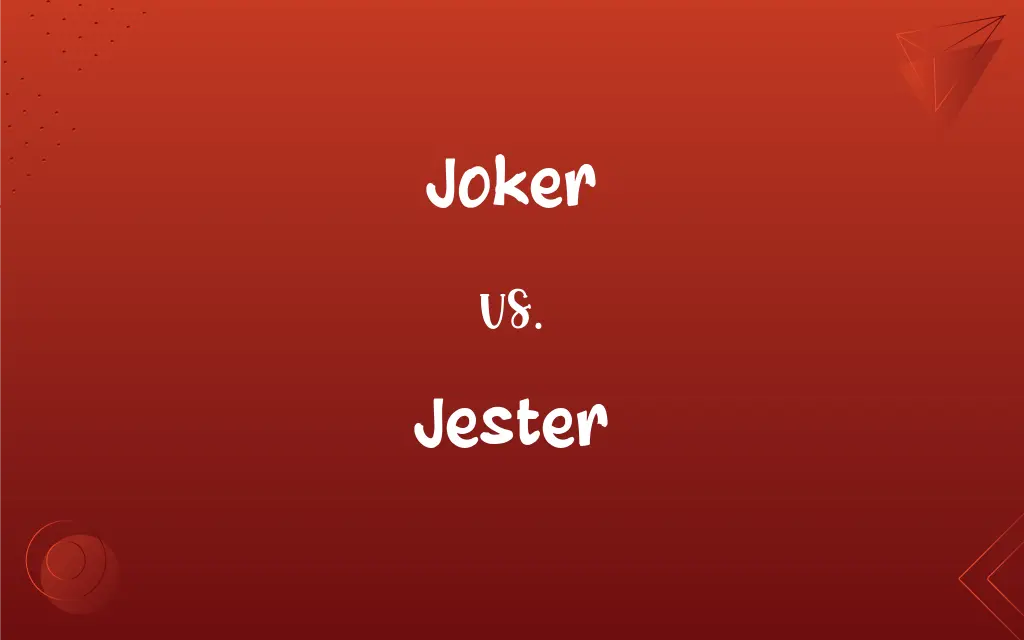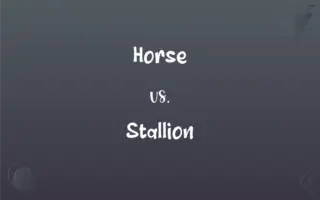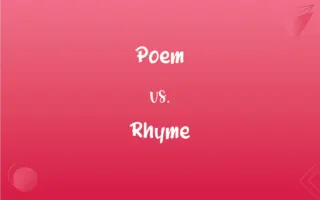Joker vs. Jester: What's the Difference?
Edited by Aimie Carlson || By Janet White || Published on January 11, 2024
A joker is a person or character who jokes or fools around, while a jester is a historical entertainer in royal courts, known for humor and mockery.

Key Differences
The term 'joker' typically refers to someone who enjoys making jokes or engaging in playful and humorous behavior. In contrast, a 'jester' historically was an official entertainer in medieval courts, often wearing a distinctive costume and hat, and known for their wit and ability to mock courtly life.
A joker can be anyone in a casual or contemporary context, often seen as light-hearted or amusing. A jester, however, was a professional role in medieval times, often skilled in music, storytelling, acrobatics, and jesting, integral to court entertainment.
In modern usage, a joker can also refer to a wild card in a deck of cards, symbolizing unpredictability. A jester, however, is deeply rooted in historical and cultural contexts, symbolizing the tradition of satire and humor in medieval courts.
The connotation of a joker can vary, sometimes perceived as irritating or unserious. A jester, on the other hand, was often granted the unique privilege to speak freely and mock anyone at court, including the royalty, under the guise of comedy.
In popular culture, the joker often appears as a trickster or comic character in various forms of media. The jester, while not as commonly depicted, is often portrayed in historical dramas or literature, representing a specific historical role.
ADVERTISEMENT
Comparison Chart
Role
Informal entertainer or trickster
Official court entertainer in medieval times
Representation
Often a character in modern media
Historical figure in dramas and literature
Connotation
Playful, humorous, sometimes annoying
Witty, satirical, granted freedom of speech
Skills
Varies, generally associated with jokes and pranks
Skilled in music, storytelling, acrobatics, and jesting
Symbolism
Unpredictability, as in a wild card
Satire and humor in a historical context
ADVERTISEMENT
Joker and Jester Definitions
Joker
A wild card in a deck of playing cards.
She won the game using the joker as a wildcard.
Jester
A character in medieval-themed literature or drama.
In the play, the jester's wisdom was hidden behind his jokes.
Joker
A playful or mischievous person.
The class joker always had a prank up his sleeve.
Jester
A skilled performer in storytelling, music, and acrobatics.
The jester entertained the court with his acrobatic antics.
Joker
Someone who makes light-hearted jokes or comments.
He was the office joker, always brightening the mood.
Jester
A historical entertainer in royal courts.
The king's jester was famous for his witty humor.
Joker
A character in literature or media known for their humor.
The joker in the movie provided comic relief.
Jester
A wearer of a distinctive, colorful costume and hat.
The jester's outfit was as colorful as his personality.
Joker
A person who doesn't take things seriously.
As a joker, he often shrugged off serious discussions.
Jester
A symbol of satire and freedom of speech in medieval times.
The jester in the court could mock nobles without punishment.
Joker
One who tells or plays jokes.
Jester
One given to jesting.
Joker
An insolent person who seeks to make a show of cleverness.
Jester
A fool or buffoon at medieval courts.
Jester
One who jests, jokes or teases.
Jester
A person in colourful garb and fool's cap who amused a medieval and early modern royal or noble court.
Jester
Any of various nymphalid butterflies of the Southeast Asian genus Symbrenthia.
Jester
A buffoon; a merry-andrew; a court fool.
This . . . was Yorick's skull, the king's jester.
Dressed in the motley garb that jesters wear.
Jester
A person addicted to jesting, or to indulgence in light and amusing talk.
He ambled up and downWith shallow jesters.
Jester
A professional clown employed to entertain a king or nobleman in the middle ages
FAQs
What does a jester represent?
A jester symbolizes humor and satire in medieval courts.
Is 'joker' a modern term?
Yes, it's commonly used in contemporary contexts.
Can 'joker' refer to a card?
Yes, it can refer to a wildcard in a deck of cards.
Can a joker be a fictional character?
Yes, often appearing in literature and media.
Are jokers always liked?
Not necessarily, as their humor can be divisive.
Are jesters still present today?
Not in their historical form, but the archetype appears in media.
What is a joker?
A person known for making jokes or acting playfully.
How were jesters viewed in society?
They were both respected and feared for their wit and freedom.
Were jesters important in history?
Yes, they were significant as entertainers and satirists in medieval courts.
Is a joker always humorous?
Generally, but the humor can sometimes be irritating.
Did jesters have special privileges?
Yes, they often had the unique freedom to speak freely.
Did jesters wear special costumes?
Yes, they wore distinctive and colorful costumes.
Do jokers have a negative connotation?
Sometimes, if associated with unseriousness or deceit.
Did jesters only entertain royalty?
Primarily, but they also performed for courtiers and guests.
Is the joker always a central character?
Not always; they can be secondary or tertiary characters.
Is the joker role gender-specific?
No, it can be played by any gender.
What skills did jesters have?
They were skilled in music, storytelling, and acrobatics.
Can anyone be a joker?
Yes, it's a role not limited by profession.
What was the purpose of a jester's humor?
To entertain and sometimes subtly criticize or satirize.
Did jesters have any other roles?
Occasionally, they acted as advisors or confidants due to their insight.
About Author
Written by
Janet WhiteJanet White has been an esteemed writer and blogger for Difference Wiki. Holding a Master's degree in Science and Medical Journalism from the prestigious Boston University, she has consistently demonstrated her expertise and passion for her field. When she's not immersed in her work, Janet relishes her time exercising, delving into a good book, and cherishing moments with friends and family.
Edited by
Aimie CarlsonAimie Carlson, holding a master's degree in English literature, is a fervent English language enthusiast. She lends her writing talents to Difference Wiki, a prominent website that specializes in comparisons, offering readers insightful analyses that both captivate and inform.































































